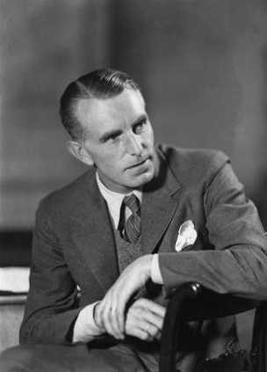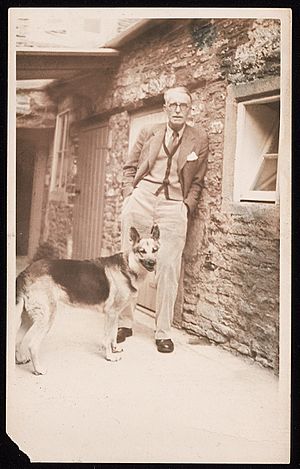J. R. Ackerley facts for kids
Quick facts for kids
J. R. Ackerley
|
|
|---|---|
 |
|
| Born | 4 November 1896 London, England |
| Died | 4 June 1967 (aged 70) London, England |
| Occupation | Writer and editor |
| Relatives | Sally Grosvenor (sister) |
Joe Randolph "J. R." Ackerley (born November 4, 1896 – died June 4, 1967) was a British writer and editor. He started working for the BBC in 1927. He later became the literary editor of The Listener, the BBC's weekly magazine. He held this job for over twenty years. During this time, he helped many new poets and writers become famous in Great Britain.
J. R. Ackerley had a half-sister named Sally Grosvenor, Duchess of Westminster.
Contents
Early Life and Education
J. R. Ackerley was born in 1896. He was first named Joe Ackerley. Later, he added Randolph as a middle name, after his uncle. As an adult, he used his initials and last name for his published works.
His father, Roger Ackerley, was a very successful fruit merchant in London. People called him the "Banana King." Roger Ackerley was married before. His first wife, Louise Burckhardt, was from a wealthy Swiss family. She died young. Louise was even painted by the famous artist John Singer Sargent in a work called Lady with the Rose.
Ackerley's mother was Janetta Aylward, an actress. She was known as Netta. Joe was one of three children born to Roger and Janetta. His older brother was Peter, and his younger sister was Nancy.
Ackerley went to Rossall School, a public and preparatory school in Fleetwood, Lancashire. After school, he tried to get into Cambridge University but did not pass the exams. So, he joined the Army instead.
World War I Experience
When the First World War began in August 1914, Ackerley joined the army. He became a second lieutenant in September 1914. He was sent to France in June 1915.
On July 1, 1916, he was hurt during the Battle of the Somme. He was shot in the arm. Pieces of a whisky bottle also got stuck in his side from an explosion. After being wounded for six hours, he was rescued and sent home to recover.
Ackerley soon volunteered to go back to the war. He was promoted to captain. His older brother, Peter, also joined the East Surrey Regiment in France in December 1916. Ackerley was Peter's superior officer. Peter was wounded in February 1917 and sadly died on August 7, 1918. Peter's death affected Ackerley deeply for the rest of his life.
In May 1917, Ackerley led an attack in the Arras area. He was wounded again, this time in his leg. While waiting for help, German soldiers captured him. As an officer, he was sent to a comfortable internment camp in neutral Switzerland. There, he started writing his play, The Prisoners of War. This play shows the boredom of being held captive. Ackerley returned to England after the war ended.
Career as a Writer and Editor
After the war, Ackerley attended Magdalene College, Cambridge. After graduating, he moved to London. He enjoyed the city and kept writing. In 1923, his play The Prisoners of War was published in a collection. This helped him start to get noticed.
He met famous writers like E. M. Forster. Ackerley's play was having trouble finding a producer. He felt a bit lost. So, Forster helped him get a job as a secretary to the Maharaja of Chhatarpur in India.
Ackerley spent about five months in India. He wrote a funny memoir about his time there called Hindoo Holiday. The book describes his experiences and observations.
Back in England, Prisoners of War was finally performed in 1925. It was very successful. Ackerley enjoyed his new fame. He met other rising stars of the stage, like John Gielgud.
In 1928, Ackerley joined the British Broadcasting Corporation (BBC). He worked in the Talks Department. This department arranged radio talks by important scholars and public figures. He helped build this new department, which had a big impact on British culture.
In 1935, Ackerley became the Literary Editor of the BBC's magazine, The Listener. He stayed in this job until 1959. He helped many young writers become known, including W. H. Auden, Christopher Isherwood, Philip Larkin, and Stephen Spender.
Later Years and Legacy
From 1943, Ackerley lived in a small apartment in Putney, London. Most of his important books were written during this time. He had a steady job at the BBC.
Ackerley took care of his sister Nancy, who needed support, and his elderly Aunt Bunny. In 1946, he got an Alsatian dog named Queenie. Queenie became his main companion for the next 15 years. He was very productive during this period. He updated Hindoo Holiday (1952) and wrote My Dog Tulip (1956) and We Think the World of You (1960). He also worked on his memoir, My Father and Myself.
Ackerley left the BBC in 1959. He visited Japan in 1960 to see his friend Francis King. He loved the beautiful scenery and the people there.
Queenie, his dog, died on October 30, 1961. Ackerley said it was "the saddest day of my life." In 1962, his book We Think the World of You won the W. H. Smith Literary Award. This award came with a lot of money, but it did not cheer him up much.
In the years after Queenie's death, Ackerley worked on his memoir about his father. His sister Nancy found him dead in his bed on June 4, 1967. He died from a heart condition.
Before he died, Ackerley sold many letters from his friend E. M. Forster. This money, along with royalties from his books, helped his sister Nancy live comfortably until she died in 1979.
Published Works
- The Prisoners of War (first performed July 5, 1925): This play is about Captain Conrad's time as a prisoner during World War I.
- Escapers All (1932): A collection of 15 true stories from men who escaped prisoner-of-war camps in World War I. Ackerley edited this book.
- Hindoo Holiday (1932, revised 1952): A memoir about Ackerley's short time as a secretary to an Indian Maharaja.
- My Dog Tulip (1956): This book tells the story of Ackerley's life with his dog, Queenie. The dog's name was changed to Tulip for the book's title. It was made into an animated movie in 2009.
- We Think the World of You (1960): Ackerley's only novel. It explores the life of a man and his family in London. It includes parts of Ackerley's experiences with his dog, Queenie (called "Evie" in the book). This novel was made into a movie in 1988.
Works Published After His Death
- My Father and Myself (1968): A memoir about Ackerley's life and his relationship with his father. This book was part of the basis for a 1979 TV movie called Secret Orchards.
- E.M. Forster: A Portrait (1970): A short biography about the writer E. M. Forster.
- Micheldever and Other Poems (1972): A collection of his poems.
- The Ackerley Letters (1975): A collection of letters, edited by Neville Braybrooke.
- My Sister and Myself (1982): Selections from Ackerley's diary, edited by Francis King. This book mostly talks about Ackerley's relationship with his sister Nancy.
In the United States, Ackerley's books are now published by New York Review of Books Classics.
Legacy and Awards
In 1980, the BBC TV series Omnibus featured a dramatized story about Ackerley. It was called We Think The World of You. It won a BAFTA award in 1981.
Ackerley's sister Nancy created an annual award called the J. R. Ackerley Prize for Autobiography. This award has been given out since 1982 to great autobiographies.
Images for kids
 | DeHart Hubbard |
 | Wilma Rudolph |
 | Jesse Owens |
 | Jackie Joyner-Kersee |
 | Major Taylor |



